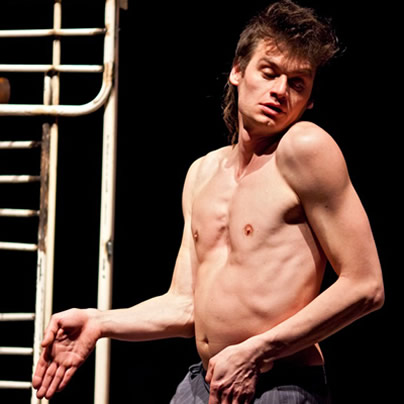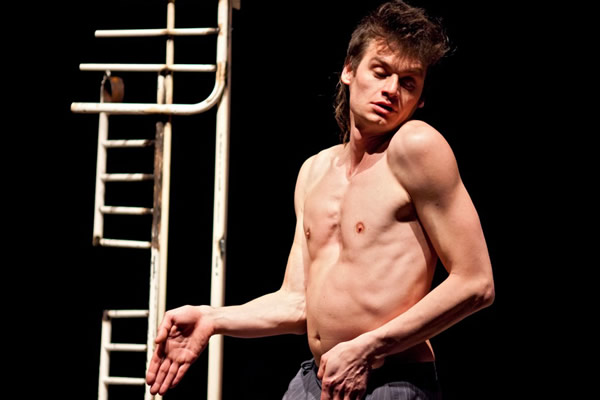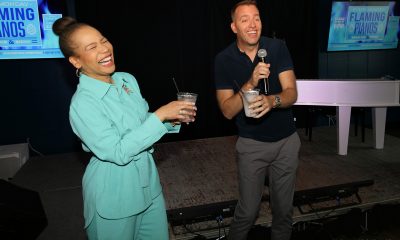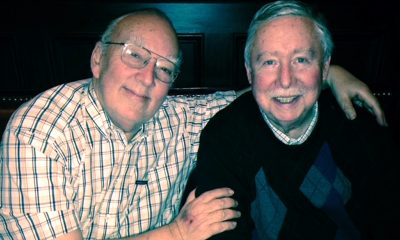Arts & Entertainment
Remembering Nijinsky
Troubled ballet legend honored in biographical show


Primoz Bezjak as Vaslav Nijinsky in ‘Nijinsky’s Last Dance.’ (Photo courtesy Mladinsko Theatre and CulturalDC)
‘Nijinsky’s Last Dance’
Aug. 26-30
Mead Theatre Lab at Flashpoint
916 G Street N.W.
culturaldc.org
Powerful, brilliant and gay, Russian impresario Sergei Diaghilev famously started the Ballets Russes in Paris in 1909, smartly bringing together the best artists, composers, choreographers, dancers and fashion designers to create the most revolutionary dance company of its era.
The unstoppable Diaghilev is equally well known for fostering the career of his much younger lover, the legendary Nijinsky (1889-1950). Roundly considered the 20th century’s greatest male ballet dancer, Vaslav Nijinsky is remembered for dancing and choreographing daring new sexually charged works like “Afternoon of a Faun,” “ Jeux” and “Rite of Spring.” Without Diaghilev’s support, it wouldn’t have happened.
“Diaghilev and the Ballets Russes, 1909–1929: When Art Danced with Music,” an exhibition currently at the National Gallery of Art (through Oct. 6) explores the man and his achievement. CulturalDC is joining the fun in presenting the Slovenia-based Mladinsko Theatre’s production of local playwright Norman Allen’s one-man play “Nijinsky’s Last Dance” at Flashpoint, D.C.’s downtown arts space.
“When I began to see pictures of Nijinsky (advertising the National Gallery show) on the sides of buses running up and down 16th Street, I knew that I wanted to be a part of this,” says Allen, who is gay. So he approached both the National Gallery and CulturalDC (part of whose mission is to match spaces for performances) and told them about this Slovenian production of his play. He suggested bringing it to D.C. would be one more way to help celebrate the exhibition. All agreed.
At 80 minutes without intermission, “Nijinsky’s Last Dance” mixes text, movement, music and sound. The piece is biographical, but rather than being strictly chronological, it’s more of a poetic, dramatic wash of his life. And though a one-man show, the actor slips in and out of other characters.
“Nijinsky was a great mimic which was a god send for me as a playwright,” Allen says. “He goes into Diaghilev for a half page. Then he’s his wife Romola Pulszky (an obsessed fan he unexpectedly married), or Tamara Karsavina (the great prima ballerina with whom he was occasionally paired).”
A longtime balletomane, Allen’s play premiered at Arlington’s Signature Theatre in 1998. It was reprised at the Kennedy Center in 2003. More recently as a guest artist in Slovenia, Allen saw the Mladinsko version.
“It’s an amazing production. A very powerful actor named Primož Bezjak plays Nijinsky,” he says. “It’s performed in Slovenian with English surtitles. And the company stipulates that no more than 60 tickets can be sold for each performance regardless of the size of the theater. The stage is encircled with just one row of chairs. Fortunately, because Flashpoint is such an intimate space, this won’t feel odd.”
Obviously well built but rather static in photographs, Nijinsky was reportedly athletically explosive and incredibly sexy and provocative on stage, as was his work.
“Nijinsky’s choreography for ‘Jeux’ was a response to Diaghilev’s desire for them to have a threesome. The ballet is choreographed for a man and two women and structured around a tennis match, but sex is at its core,” Allen says. “But it’s ‘Afternoon of a Faun,’ though, that is truly a sexual experience. Nijinsky shocked the audience at the premiere when he placed a nymph’s veil on the stage and lowered himself onto it, rubbing his crotch against it, imagining it to be her. By all accounts his astounding stage presence was sexual in nature. In ‘Faun,’ he created a role that gave him a direct means to express that.”
Around the time when the First World War broke out, Nijinsky began to show signs of schizophrenia, an illness that would soon after effectively end his career. Allen believes Nijinsky’s professional and personal crackup mirrored the war.
“Nothing would ever be the same. Everything fell apart. The world view changed. And he couldn’t make that transition,” he says.
One of Nijinsky’s last dances, says Allen, was an improvisational piece performed at a ballroom in Saint Moritz before an invitation-only audience. Already mentally ill but still traveling Europe with his wife and children, Nijinsky’s intention was to dance the war, physically expressing horror and disillusionment. Reviews weren’t great.
Allen recommends making a trip to the National Gallery before seeing the show. A section of the exhibit is dedicated to Nijinsky. Unfortunately there is no footage of Nijinsky dancing — not a single frame exists. “It’s a shame in way,” Allen says. “But it also contributes even more to Nijinsky’s status as a legend.”
Sports
Bisexual former umpire sues Major League Baseball for sexual harassment
Brandon Cooper claims female colleague sexually harassed him

A fired former umpire is suing Major League Baseball, claiming he was sexually harassed by a female umpire and discriminated against because of his gender and his sexual orientation.
Brandon Cooper worked in the minor league Arizona Complex League last year, and according to the lawsuit he filed Wednesday in federal court in Manhattan, he identifies as bisexual.
“I wanted my umpiring and ability to speak for itself and not to be labeled as ‘Brandon Cooper the bisexual umpire,’” he told Outsports. “I didn’t want to be labeled as something. It has been a passion of mine to simply make it to the Major Leagues.”
But that didn’t happen. Instead of being promoted, he was fired. His suit names MLB and an affiliated entity, PDL Blue, Inc., and alleges he had endured a hostile work environment and wrongful termination and/or retaliation because of gender and sexual orientation under New York State and New York City law.
“Historically the MLB has had a homogenous roster of umpires working in both the minor and major leagues,” Cooper claims in his suit. “Specifically, to date there has never been a woman who has worked in a (regular) season game played in the majors, and most umpires are still Caucasian men. To try to fix its gender and racial diversity issue, defendants have implemented an illegal diversity quota requiring that women be promoted regardless of merit.”
Cooper claims former umpire Ed Rapuano, now an umpire evaluator, and Darren Spagnardi, an umpire development supervisor, told him in January 2023 that MLB had a hiring quota, requiring that at least two women be among 10 new hires.
According to the suit, Cooper was assigned to spring training last year and was notified by the senior manager of umpire administration, Dusty Dellinger, that even though he received a high rating in June from former big league umpire Jim Reynolds, now an umpire supervisor, that women and minority candidates had to be hired first.
Cooper claims that upon learning Cooper was bisexual, fellow umpire Gina Quartararo insulted him and fellow umpire Kevin Bruno by using homophobic slurs and crude remarks. At that time, Quartararo and Cooper worked on the same umpiring crew and being evaluated for possible promotion to the big leagues.
This season, Quartararo is working as an umpire in the Florida State League, one of nine women who are working as minor league umpires.
Cooper said he notified Dellinger, but instead of taking action against Quartararo, he said MLB ordered Cooper to undergo sensitivity training. According to his lawsuit, he was also accused of violating the minor league anti-discrimination and harassment policy.
Cooper’s suit says he met with MLB Senior Vice President of Diversity, Equity and Inclusion Billy Bean — who the Los Angeles Blade reported in December is battling cancer.
The lawsuit says at that meeting, Bean told the umpire that Quartararo claimed she was the victim, as the only female umpire in the ACL. Cooper said he told Bean Quartararo regularly used homophobic slurs and at one point physically shoved him. He also claims that he has video evidence, texts and emails to prove his claim.
But he said his complaints to Major League Baseball officials were ignored. His lawsuit said MLB passed him over for the playoffs and fired him in October. He said of the 26 umpires hired with Cooper, he was the only one let go.
Through a spokesperson, MLB declined to comment on pending litigation. Quartararo has also not publicly commented on the lawsuit.
a&e features
Eastern Shore chef named James Beard Finalist
Harley Peet creates inventive food in an inclusive space

In a small Eastern Shore town filled with boutiques, galleries, and the occasional cry of waterfowl from the Chesapeake, Chef Harley Peet is most at home. In his Viennese-inflected, Maryland-sourced fine-dining destination Bas Rouge, Peet draws from his Northern Michigan upbringing, Culinary Institute of America education, and identity as a gay man, for inspiration.
And recently, Peet was named a James Beard Finalist for Best Chef: Mid-Atlantic – the first “Best Chef: Mid-Atlantic” finalist representing the Eastern Shore.
Peet, after graduation from the Culinary Institute of America, took a position as sous chef at Tilghman Island Inn, not far from Bas Rouge. Falling in love with the Eastern Shore, he continued his passion for racing sailboats, boating, gardening, and fishing, and living his somewhat pastoral life as he opened Bas Rouge in 2016 as head chef, a restaurant part of the Bluepoint Hospitality group, which runs more than a dozen concepts in and around Easton, Md.
Coming from a rural area and being gay, Peet knew he had his work cut out for him. He was always aware that the service and hospitality industry “can be down and dirty and rough.”
Now as a leader in the kitchen, he aims to “set a good example, and treat people how I want to be treated. I also want to make sure if you’re at our establishment, I’m the first to stand up and say something.”
The Bas Rouge cuisine, he says, is Contemporary European. “I’m inspired by old-world techniques of countries like Austria, Germany, and France, but I love putting a new spin on classic dishes and finding innovative ways to incorporate the bounty of local Chesapeake ingredients.”
His proudest dish: the humble-yet-elevated Wiener Schnitzel. “It is authentic to what one would expect to find in Vienna, down to the Lingonberries.” From his in-house bakery, Peet dries and grinds the housemade Kaiser-Semmel bread to use as the breadcrumbs.
Peet works to support the LGBTQ community inside and outside of the kitchen. “I love that our Bluepoint Hospitality team has created welcoming spaces where our patrons feel comfortable dining at each of our establishments. Our staff have a genuine respect for one another and work together free of judgment.”
Representing Bluepoint, Peet has participated in events like Chefs for Equality with the Human Rights Campaign, advocating for LGBTQ rights.
At Bas Rouge, Peet brings together his passion for inclusion steeped in a sustainability ethic. He sees environmental stewardship as a way of life. Peet and his husband have lived and worked on their own organic farm for several years. Through research in Europe, he learned about international marine sourcing. Witnessing the impacts of overfishing, Peet considers his own role in promoting eco-friendly practices at Bas Rouge. To that end, he ensures responsible sourcing commitments through his purveyors, relationships that have helped create significant change in how people dine in Easton.
“I have built great relationships in the community and there’s nothing better than one of our long-standing purveyors stopping in with a cooler of fresh fish from the Chesapeake Bay. This goes especially for catching and plating the invasive blue catfish species, which helps control the species’ threat to the local ecosystem.
Through his kitchen exploits, Peet expressed a unique connection to another gay icon in a rural fine-dining restaurant: Patrick O’Connell, of three Michelin starred Inn at Little Washington. In fact, Peet’s husband helped design some of O’Connell’s kitchen spaces. They’ve both been able to navigate treacherous restaurant-industry waters, and have come out triumphant and celebrated. Of O’Connell, Peet says that he “sees [his restaurants] as canvas, all artistry, he sees this as every night is a show.” But at the same time, his “judgment-free space makes him a role model.”
Being in Easton itself is not without challenges. Sourcing is a challenge, having to either fly or ship in ingredients, whereas urban restaurants have the benefit of trucking, he says. The small town “is romantic and charming,” but logistics are difficult – one of the reasons that Peet ensures his team is diverse, building in different viewpoints, and also “making things a hell of a lot more fun.”
Reflecting on challenges and finding (and creating) space on the Eastern Shore, Peet confirmed how important it was to surround himself with people who set a good example, and “if you don’t like the way something is going … move on.”

Team DC, the umbrella organization for LGBTQ-friendly sports teams and leagues in the D.C. area, held its annual Night of Champions Awards Gala on Saturday, April 20 at the Hilton National Mall. The organization gave out scholarships to area LGBTQ student athletes as well as awards to the Different Drummers, Kelly Laczko of Duplex Diner, Stacy Smith of the Edmund Burke School, Bryan Frank of Triout, JC Adams of DCG Basketball and the DC Gay Flag Football League.
(Washington Blade photos by Michael Key)



















-

 State Department2 days ago
State Department2 days agoState Department releases annual human rights report
-

 Maryland4 days ago
Maryland4 days agoJoe Vogel campaign holds ‘Big Gay Canvass Kickoff’
-

 Politics3 days ago
Politics3 days agoSmithsonian staff concerned about future of LGBTQ programming amid GOP scrutiny
-

 The White House1 day ago
The White House1 day agoWhite House debuts action plan targeting pollutants in drinking water












